Ideas for adult language learners
Four ideas, reviewed
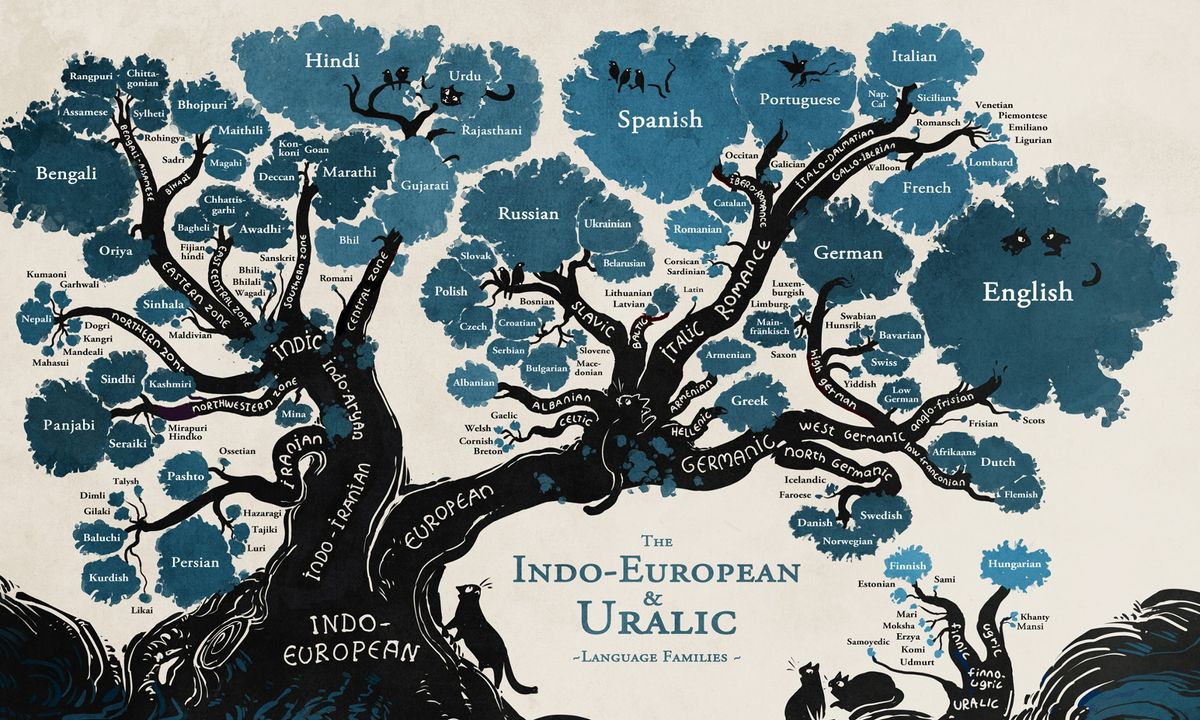
This post will look at four common claims about language learning and evaluate them with scientific evidence and personal experience.
The four claims to be evaluated are:
#1. Grammar is the most important thing about learning a new language.
#2. I will barely make any progress because there are too many new words to learn.
#3. It takes too long to make progress and I'll probably end up giving up.
#4. I need to live in the country to properly learn the language.
Are these claims true?
Let's see.
Too Long Didn't Read (a very quick summary of the whole essay)
Over the course of the 15 minute essay below, I examined scientific evidence and personal experience to turn these four propositions on their head. I conclude with four new propositions, which maybe aren't as catchy, but are more accurate:
#1 Grammar is not that important for language learning, especially at first. Instead, use your instinct. And think like a baby.
#2 Adult language learners can IGNORE the vast majority of the words in the language they are trying to learn. Instead, they should take advantage of the non-linear statistical distribution of vocabulary. This means they can focus on acquiring and learning the most important words and phrases that people actually use, which is a very small amount compared to the total amount of words that exist in a given language.
#3. Language learning must be broken up into small steps that builds up over time. Even babies take time to learn. Take advantage of critical thresholds, and do not expect not to feel any progress for at least 6 months. Take breaks, and know that how language is stored in your brain means you likely will not lose all of your knowledge, which may happen with other academic subjects like mathematics.
#4. To learn the language of another country I do not need to live in that country. Instead, I need to deliberately engage in system 2 reasoning, where I wilfully decide to slowly engage in the language learning process. IF I do this AND live in the country where I'm learning the language, THEN this is the best recipe. But living in the other country, by itself, is NOT a recipe for language learning. What is more likely to happen is system 1 reasoning, where my communication will fall to the lowest common denominator, which is probably English (assuming they speak English, which they probably do).
I think that many people find the idea of learning a new language interesting, but find the idea of learning grammar pretty daunting.
I should know, I'm one of them.
And yet in two years as an adult learner (ages 23 to 25), I went from almost no knowledge of German to being able to communicate with other German speakers about most basic things. During learning, grammar wasn't my top priority.
At first - for the 6 months of learning - I essentially learned NO GRAMMAR.
Instead I did what babies do: listen and speak.
Have you ever seen a baby reading a grammar book? It would be stupid, and it might look like this:

No, this isn't how children learn to speak.
In London and New York. Dublin and Moscow. Jakarta and Tehran. Berlin and Tokyo.
In the north of Norway where the Sami live, and in central African desert where the Bushmen live.
Not in any of these places will you find babies learning to speak language with a grammar book.

Hunter gatherer parents are not carrying out lessons on subjunctive clauses.
Babies in America are not asking which past participle goes where.
Parents in Australia (and me too) aren't quite sure what an adverb is.
Despite all of this, in all places around the world that anthropologists are aware of, we have language - babies, children, teenagers, and adults talking, all speaking language (1).
If all these people in all these places get by without grammar books as babies, why are language learning adults told that grammar is sooooo important (and serious and difficult and needs to be studied lots).
Here's my counter proposition:
#1 Grammar is not that important for language learning, especially at first. Instead, use your instinct. And think like a baby.
If grammar was so damn important, we really would see babies around the world struggling to understand and comprehend grammar books.
But we don't.
Why?
Scientists study language (2). They've discovered some interesting things.
In scientific circles, it is usually more accurate to say that we have amounted evidence in support of an idea, rather than having uncovered the exact nature of something - in this case, language.
We are first talking about language in humans, which means we need to ask: how old is language, and where did it come from?
The best scientific understanding of answers to this question can be found in the past. Specifically, in our shared evolutionary history.
According to Darwinian theory, life on earth is the way it is because of evolution by natural selection (3). Indeed, a famous paper in biology is fitting titled, Nothing in Biology Makes Sense Except in the Light of Evolution (4).
As Dobzhansky himself puts it:
"The best way to envisage the situation is as follows: the environment presents challenges to living species, to which the latter may respond by adaptive genetic changes".
Organisms replicate, become modified, and then spread these modifications throughout the population. Humans, and the language they speak, are no different.
Over mind-bending stretches of time, organisms become more complex, and develop their unique behavioural patterns. This is because the organisms are first able to reproduce, and second, able to experience genetic mutations in their DNA, which slightly alters the future organisms ability to do things in the world (5).
It is by replication and mutation that more complex forms of life emerge.
Each organism adapts to the environment in which it lives, because the particular mutations and the behavioural traits they cause, get selected by different environments.
From this we get diversity.
Birds fly. Snails crawl. Fish swim. And humans talk.




New organisms with different talents (because of different mutations) eventually overpower the older organisms with less useful mutations (less useful in that particular environment).
Evolution is conservative because most new mutations and the behaviours that accompany them are not improvements on what came before.
Only the improved mutations survive - the rest die.
Hence the ancestors of humans are not still here.
Modern humans (Homo Sapiens) live on at the expense of all their close related ancestors, who are now extinct (6).
Some scientists think that language is a human instinct.
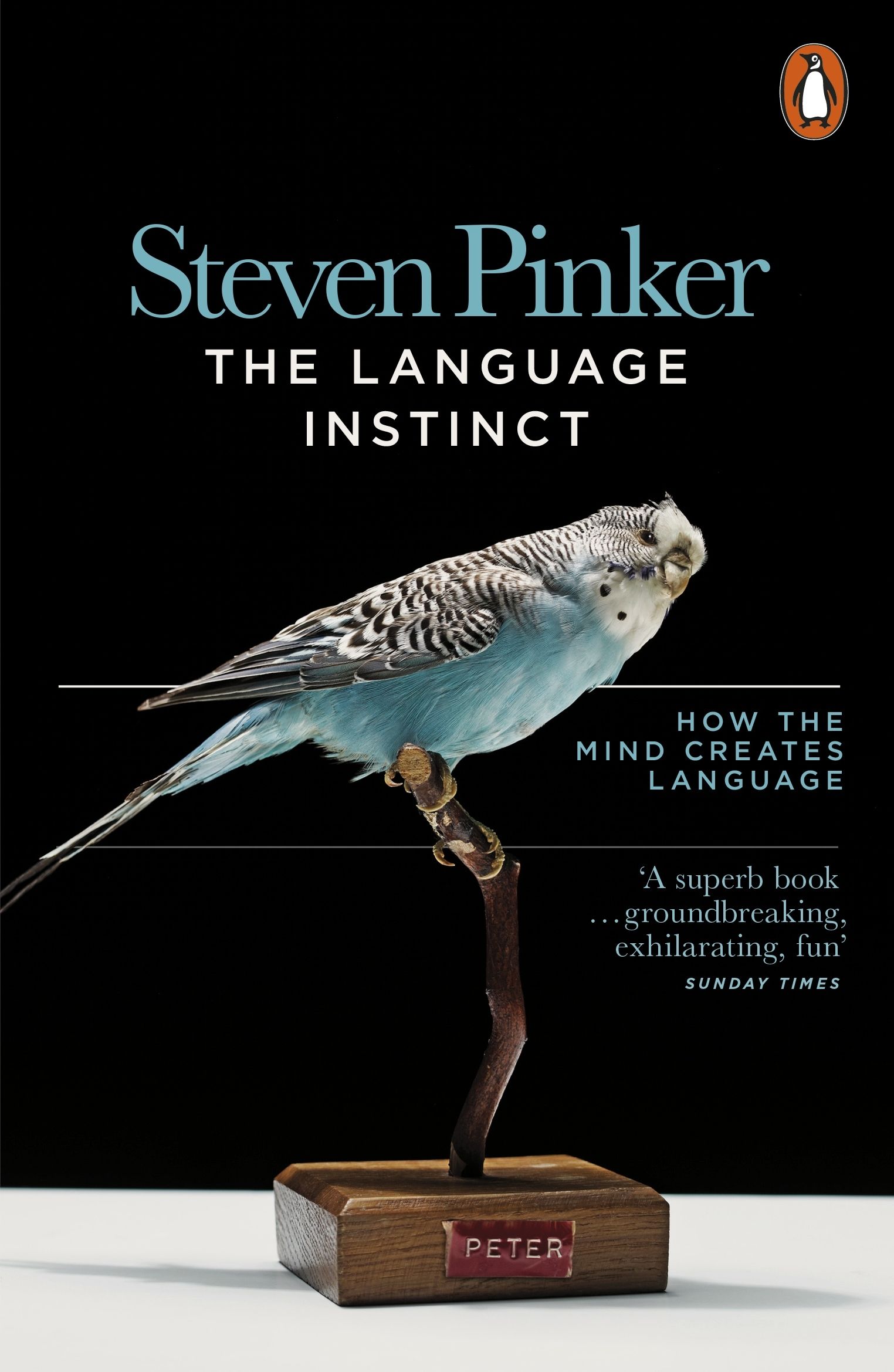
An instinct that has been developed and evolved over evolutionary time. A biological adaption that can (and should) be understood through Darwinian theory.
Just as birds come into the world 'knowing' how to fly (birds do not read books called Flying for Dummies), as snails 'know' how to crawl, and fish 'know' how to swim, so too do humans 'know' how to talk.
Genetic information within the human genome causes humans brain regions to develop, which govern human language processing (7).
These are facts.
Or to put it in more scientific terms, these are both ideas which are supported by evidence, but which are open to contradictory claims (these contradictory claims are not supported by the same weight of evidence, hence we can be more confident in our language instinct idea).
Is it so hard to believe that language is one our human instincts?
Human parents do not teach their children to speak, and bird parents do not teach their bird children to fly.
Both know - instinctively - what to do.
In fact, the brain of a human child expends a vast amount of energy on language processing at a young age. It goes through a "critical period", in which vast brain amounts of brain energy are expended so that the young person can absorb and develop their language capabilities incredibly quickly.
Recent data suggest this critical period may extend up to age 18, but is surely most powerful in the younger years (8).
This makes evolutionary sense.
Language is incredibly powerful and useful because it allows humans to communicate to each other about risks and potential rewards ("our thoughts die so we don't have to", 9).
Selection pressure may have favoured those who could acquire language skills fast, and leave the others who couldn't (and their genetic mutations) behind.
In the rare cases where human babies have been deprived of parents or parental figures to give them feedback on their language use, it becomes hard for these children to speak language in later adult life.
They have missed the critical window, or at least the critical window they've had has been significantly weakened by not having parental figures with whom to practice with.
Language may be instinctual, but it still requires practice.
At the other extreme, babies can learn multiple language at essentially equal speeds when they are going through the critical period. Children of an English father and a Dutch mother but who grow up in the German speaking part of Switzerland will, if exposed equally to all three languages (English, Dutch, German) acquire all three.
Grammar is at it's LEAST important during the critical window. Because babies just listen and speak - they do not deliberate about which grammatical form goes where (though they do seem to have an instinctual understanding of grammar itself, 2)
Human genes and brains come into the world equipped to instinctively acquire the languages spoken around them.
To be particular, language is not learned, it is acquired.
Humans learn how to tie their shoe laces (there are no genes to do this) but they instinctively acquire the capabilities to eat and digest food (they do not need to learn this).
Language, so the scientists think, is in this category.
We acquire language, and learn to tie our shoes.
We all come into the world with particular human genetics and brains, and this is why we can even speak the language we can at all.
Humans cannot fly because they do not have the genetic information and brains that birds have, and vice versa.

As humans leave the critical period for language learning (which may extend up to age 18), grammar does become more important. But never is it the most important thing about language learning.
What is more important is to do what babies do.
When learning a new language you should think like a baby.
Listen to the language.
Copy others who are better than you.
Speak.
Make mistakes.
Try things out.
Let your brain absorb the rhythm, cadence, tone, and feel of the language.
You have a language instinct in you.
Use it!
And after you feel more at ease with the language you're learning, get the grammar book out - it will help you.
Acquire as much of the language as you can first instinctually as any well-respecting baby would.
Then, learn.
Learning grammar is a struggle, especially if you are not wired for mathematical or technical algorithms, which is essentially what grammar is (if you are technically minded, you may well find learning the algorithms of grammar rather fun, but I don't think this is how most people are).
Grammar is a set of (boring) if-then rules. Indeed, some people will enjoy this aspect of the language learning process.
But, probably, most won't.
Grammar is difficult, unnatural to learn (rather than acquire through instinctual ways), and I reckon that many people don't like it.
Having said all of this, I came to appreciate grammar vastly.
Most adult language learners learn mistaken grammar. They generally don't reach native level sophistication (though this can and does happen, 8).
Nevertheless, grammar really is is beautiful. It makes languages what they are.
Language exist in families. The universal grammar in the human languages of the world is something awesome in our common ancestry, and is something to be admired.
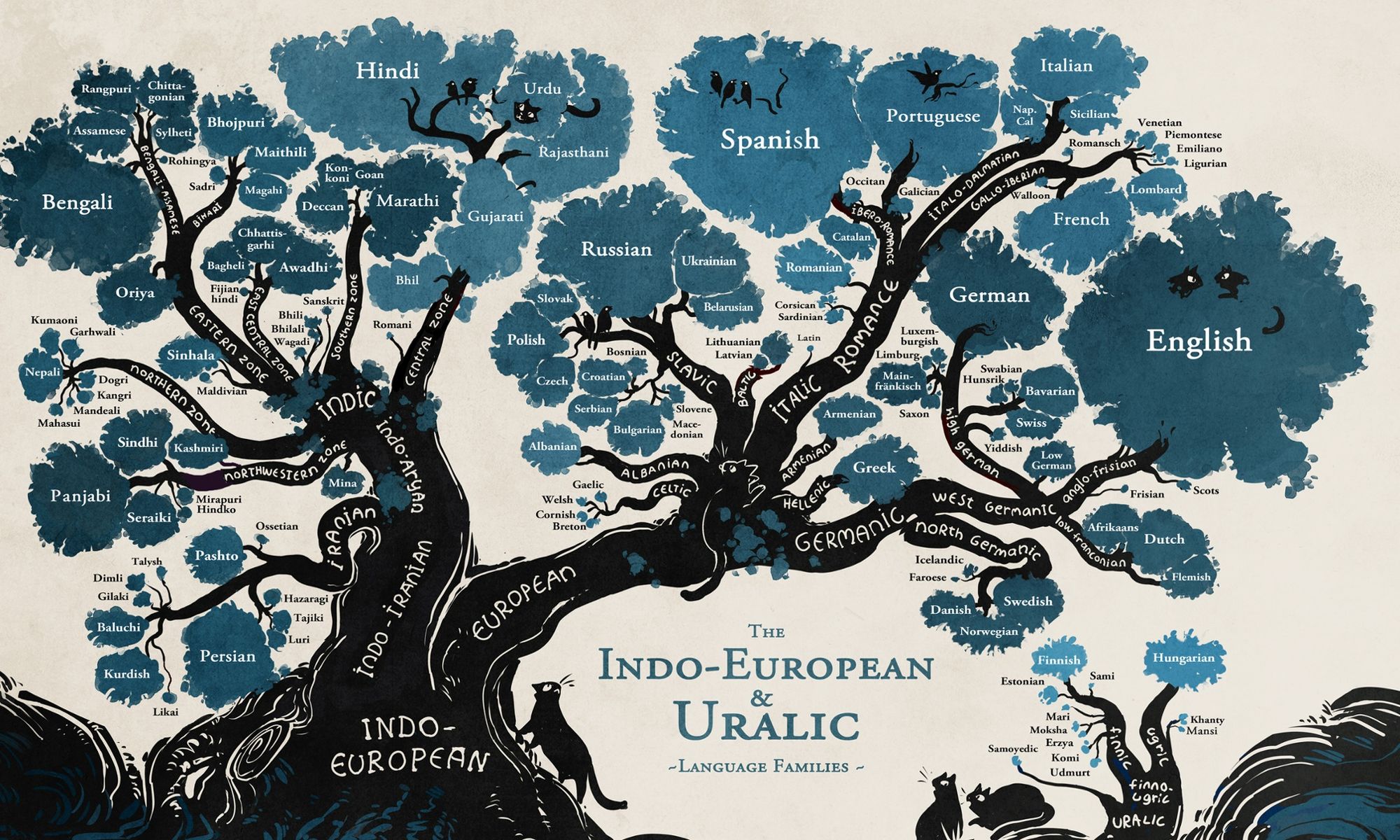
Alas, let's move on.
Many people start acquiring/learning a language, but find it overwhelming
After all, languages have a lot of words. How important is it to learn all that new vocabulary?
And how much is enough?
We've established that grammar is hard, but that it's really not the be all and end all of language.
Another hurdle is the sheer volume on language.
Let's look at the English language, which has, at one estimate by the Oxford English Dictionary, 17.476 words (10).
Shit, that's a lot of words.


How are people meant to work 9 to 5 and learn so much stuff?
Let's go back to basics, and to the clever people: babies.
Hello, baby.
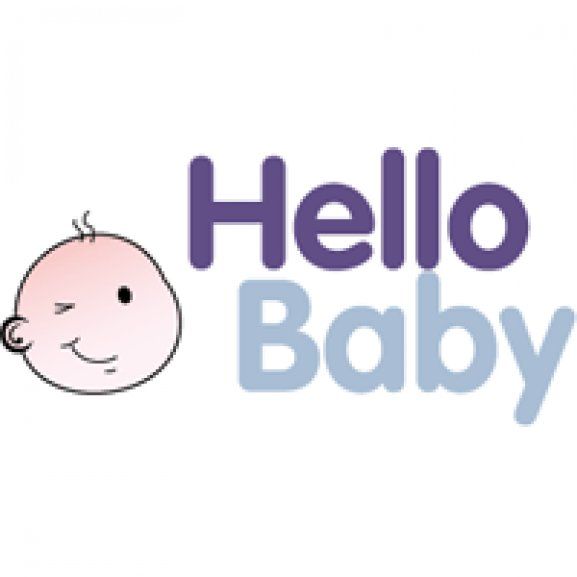
By the age of 18 months, infants can typically produce around 50 words, and begin to engage in word combinations (11).
Those last two words were key: word combinations.
Fancy term alert: language is.... a discrete combinatorial system (2).
What does it mean that language is a discrete combinatorial system?
It means that languages use combinations of finite words in different orders to create different meanings. One thing this means it that language is infinite - or recursive - because you can always add another word to end the sentence.
But for adult learners it is incredibly important, too.
Adult learners DO NOT have to come any close to learning all of the words in a language.
Instead, they have to acquire (and also learn) useful combinations of words.
Certain words will combine in interesting ways and will be able to be deployed in lots of situations.
This is because of the non-linear statistical distribution of words used in language (12).
What this means is that a very small proportion of the total words in language constitute the vast majority of interactions within that language.
To explain by analogy, think about the best songs ever produced, the best books published, or the best films.
A very small proportion out of the whole amount of songs, books, and films are consumed by the vast majority of people.
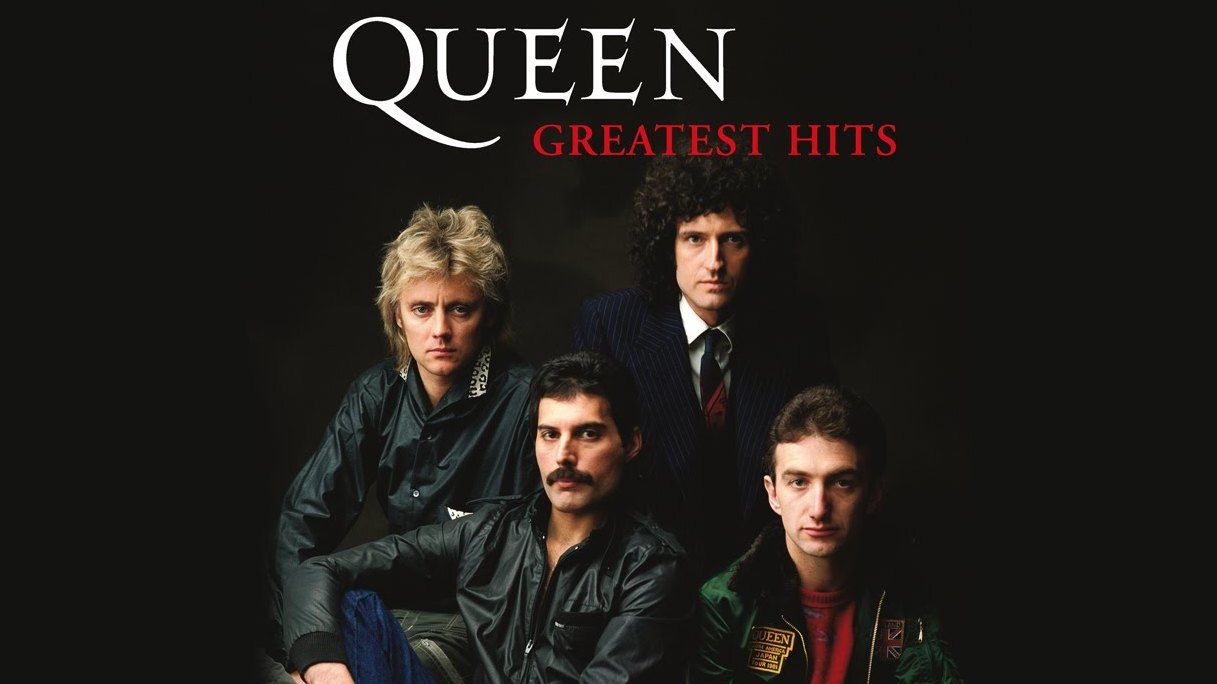
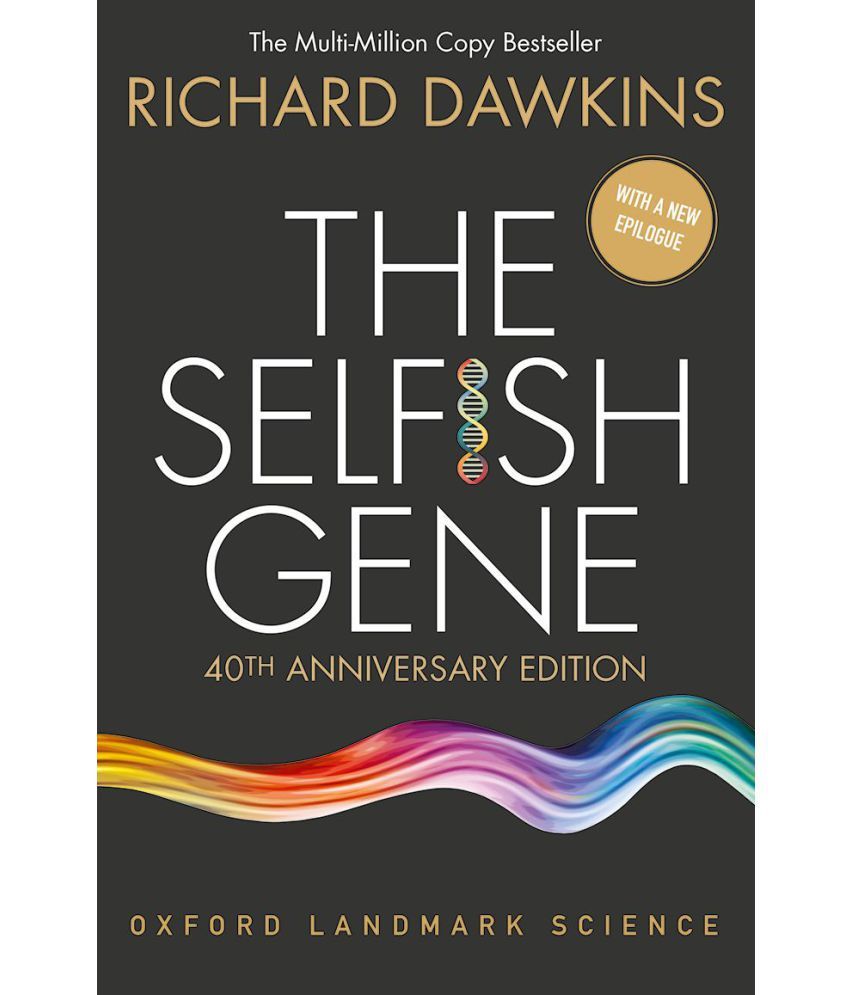

Evolutionary biologist Richard Dawkins, who wrote perhaps one of the most important biological books since Darwin (The Selfish Gene, 1976), once complained that people would always ask him to sign this book, rather than his newer ones. People knew him for his big work, but perhaps hadn't read his newer (less best-selling) books (5).
It is for the same reason that most people have heard of artists "big songs", but when they attend a concert the artist will play all the "smaller songs" (less well known) that only the real fans will know about.
Most people will have heard of films like Lord of the Rings, Avatar, The Avengers, but will have no idea about niche Art House or Creative films.
Language is like this.
Yes, English may have over 170,000 words - but how many of those words are actually used?
Everyday life is populated by the same, boring, and familiar words.
These are words like: I, go, what, where, when, was, at, you, buy, do, write, eat, sleep, sex, weather, etc.
Everyday life is not populated by words like: sextant, longitude, acnestis, meldrop nauseant, and obelus.
These are all real words! But I had no idea the last four ever existed.
And it's been a while since I heard someone talk about longitude or a sextant (outside the historic longitude problem in the history of science, 13).
What does all of this mean?
Are there too many words to learn in language?
Is it just too hard?
I offer a counter proposition:
#2 Adult language learners can IGNORE the vast majority of the words in the language they are trying to learn. Instead, they should take advantage of the non-linear statistical distribution of vocabulary. This means they can focus on acquiring and learning the most important words and phrases that people actually use, which is a very small amount compared to the total amount of words that exist in a given language.
In my Russian learning, which I started learning two months ago, I've completely ignored the grammar so far, and recently just finished this video, which details the most 100 common words in the language.
I won't spend any time on this issue, though.
The implication is obvious: target what you are trying to learn by ignoring the vast majority on unimportant words and phrases.
Learn the important combinations of words.
Leave the rest (at least for now).
In doing so, you'll take advantage of the non-linear statistical nature of language! Sweet.
Another reason language is hard, however, is that people feel like they aren't making progress.
Should people just give up?
So grammars not that important, neither are most of the words in a language.
But isn't it true that it takes way too long to learn a language, and that most adults will feel overwhelmed, eventually giving up?
I don't know of any datasets that estimate how many people start learning a new language as an adult, but give up.
I have my personal experience of being inside language classes, however.
How does it go? A bit like this:
The language classes start off big.
Then they get smaller with time.
Give it some more time.
They get smaller still.
In other words, people begin - but then give up.
And this might indeed be because once they started they realised how monumental the task of learning a language actually is. Or at least, that's how they perceived it.
Personally, I attempted to learn German on two different occasions and gave up. Only on the third time, with the leisure of the COVID lockdown, the commitment to multiple paid courses, and a kind of system for study, did I stick at it.
Earlier, we talked about critical periods.
Here, we'll talk about critical thresholds.
Because I've written about them in another post on creativity, I'll reproduce what I've written here, as it's relevant.
Imagine you started learning a language.
Let's say it's Spanish.
You've been practicing for months, but it's been difficult, and you're not feeling like you've made that much progress.
You're doing the work. You're involved in the creative process.
But it just feels sluggish. The Spanish words make a bit of sense, but not much.
The grammar is sometimes understandable, but most of the time it just doesn't make sense! You may feel like our elephant friend below...

This experience is, I believe, pretty normal for most adults who have attempted to learn a second language. It's frustrating!
Take a look at the graph below.
Our Spanish student is at point B.
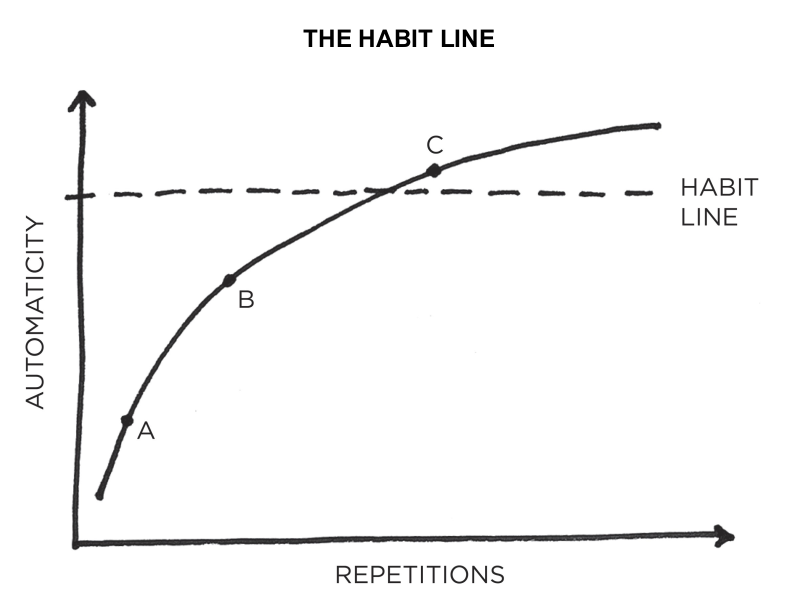
What seems to happen in habit formation (such as learning a new language as an adult) is that it feels difficult for days, weeks, months (14).
Until one day...
You go from point B to point C, crossing the critical threshold.
At point B, our Spanish learner still finds everything really quite difficult, and considers giving up their creative pursuit.
But let's say they don't give up.
They keep going despite their dearth of understanding and frustration with the lack of progress. One day, perhaps after 6 months, maybe 12 months, they realise that they can speak basic Spanish!
They can introduce themselves, listen to others speak a basic conversation, ask questions, count numbers, and recognise basic grammar patterns.
But another world exists, where, at point B, the person felt that no progress was being made, and they gave up. Lots of people attempt to form new habits but give up before they reach the critical threshold, where they really begin to feel and notice their progress.
Crossing the critical threshold of learning Spanish might feel like this:
"Okay, so I've been doing this a while.... And....nothing, no progress. It's difficult, and, to be honest, I have a depressed outlook towards this, it's just too difficult. Actually, yep. I hate this! Okay, but despite hating this, I'll still practice anyway, I guess. Ugh - why am I practicing this? Then, wait a second. Hang on. I'm improving! I can feel the improvement, I'm actually learning Spanish. Okay, I'm still pretty bad, true. But compared to where I was when I started, I've come a long way!"
The concept of critical thresholds is... critical!
It explains why we feel "no progress" for days, months, perhaps years in some cases, but then it suddenly all emerges - the dots connect.
Languages are complicated.
The grammar is hard.
The words are many (too many).
And so it's understandable that people would feel overwhelmed, and just give up. But there's one other optimistic finding.
There is evidence that people retain language very effectively. As a recent study puts it:
"Learners retained around 70% of the vocabulary they had learned after 25 years, despite not having used the language at all in the interim" (15).
To contrast, a similar test for mathematical knowledge found that people tended to forget pretty much everything. This suggests that language is stored in the brain differently to how an academic subject like maths is stored.
It seems that the way language is stored in the brain makes retrieval of that information easier, which means you shouldn't feel guilty about taking lots of breaks from your study.
Even when you take decent breaks (months, years) from your language learning, you'll likely retain more than you realise when you come back to it.
Taking all of this together, let's offer a new counter proposition:
#3. Language learning must be broken up into small steps that builds up over time. Even babies take time to learn. Take advantage of critical thresholds, and do not expect not to feel any progress for at least 6 months. Take breaks, and know that how language is stored in your brain means you likely will not lose all of your knowledge, which may happen with other academic subjects like mathematics.
Make your habits atomic.
Atoms are the building blocks of the universe. Without them, life as we know it wouldn't exist.
And yet, we barely know they exist.
This is how you should practice language learning.
Small steps.
Build it over time.
Listen. Speak. Write. Read.




Little by little.
Take breaks for days, weeks - even months or years should be fine!
But come back to the task. Your brain and genetics are wired in such a way that they 'want' you to acquire that new language (2).
And one day, you'll cross the critical threshold.
Stupid as it sounds, every little helps.
I remember crossing the critical threshold with German, where suddenly it felt like I could understand and speak (in a very basic way) with another person - it was amazing!
It also took a year.
And before it happened, I was thinking about giving up because I wasn't sure that I had been making good progress (I was doing mostly online learning).
Alas, it feels good when the dots connect. But they build up slowly.
Even the genius babies build their language up - they do not walk around playgroup asking the other children politely if they would like to share their toys, then after school meet up for a coffee, and discuss Bertrand Russel's Introduction to Mathematical Philosophy (1918).
Language learning takes time, even for babies.
Scientific research suggests that small habits - atomic habits - are a key tool for helping people to keep going when learning something new (like language).
Breaking things down into small chunks really does help.
So with this in mind, does any of this matter? Isn't is true that I need to live in Spain if I want to learn Spanish?
This is the conventional wisdom that I often hear people say.
Let's see.
I remember when I worked in Berlin for 2 months over the summer, age 20.
I'd studied German for a bit in school but couldn't really remember basic things like the numbers or even introductions. But I was in Germany now, surely - like a magical sponge - I would absorb all of that beautiful German speak.
I didn't.
Hm, but what about two years later, when I found myself working on a German summer camp teaching the English language to children?
Sure, the focus was on teaching them my language, but wouldn't I pick up some of theirs?
No, not really.
The idea that a person needs to live in the country in order to learn that countries language is, to my mind, a pernicious myth.
It's simply not true.
Human beings are, according to a standard psychology textbook, cognitive misers (16).
What this means it that humans seem to have an preference towards doing what is easy cognitively, rather than what is hard.
If you give professional statisticians statistical questions for them to answer outside of work, they won't come back to you with the right answers (17). They'll answer, but fall into easy cognitive traps, and get lots of questions wrong.
They do this because they don't engage in that slow, deliberate reasoning.
Readers, what is 17*23?
To answer this question without a calculator, you need to engage in slow, deliberate, reasoning.
Psychologists often use the metaphor of system 1 and system 2 to describe this kind of human reasoning (they do not describe systems in the brain exactly, or even particular areas of the brain, but paint a useful metaphor for to us understand how brains work).
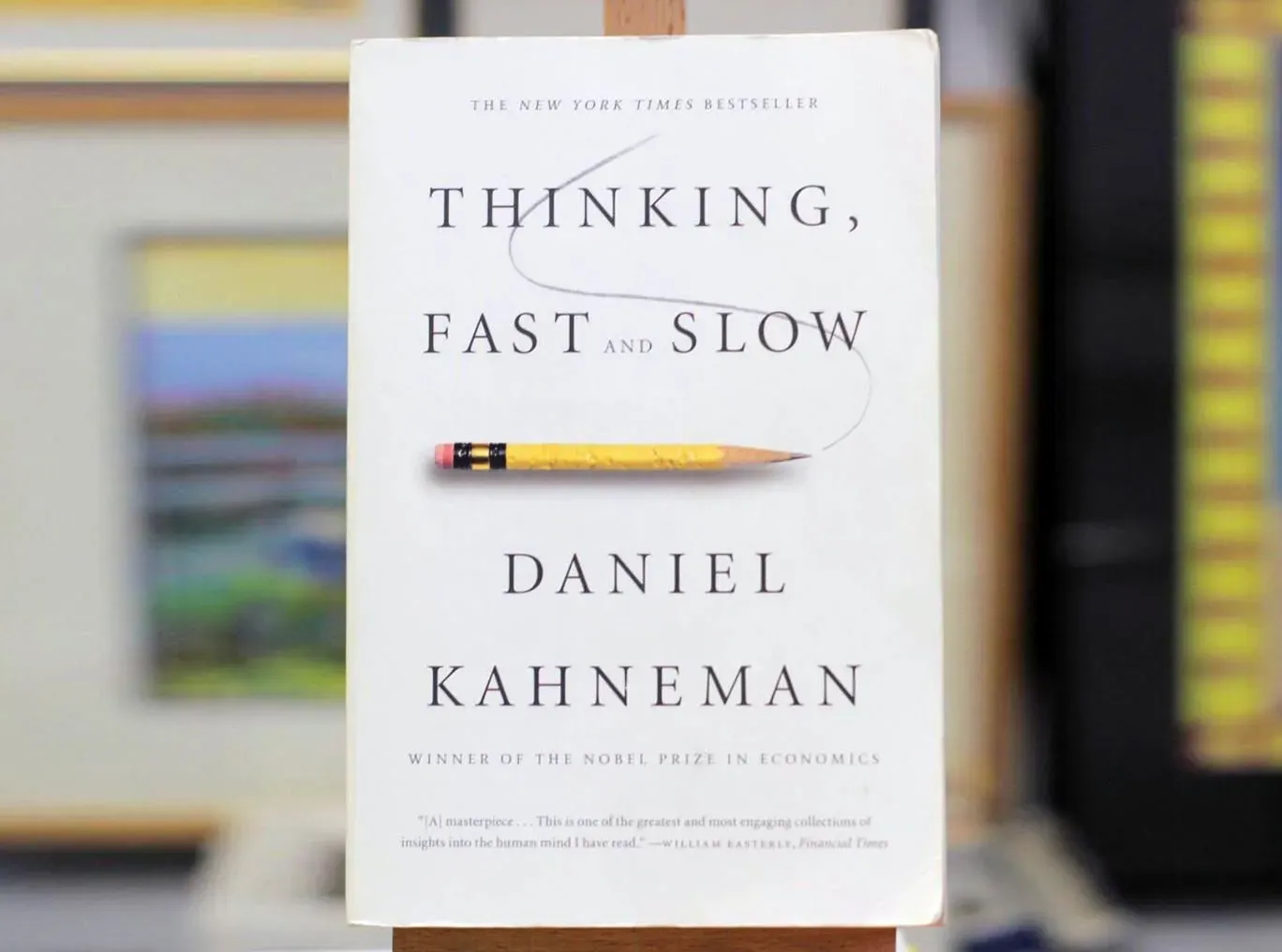
System 1 is automatic. It's the home of intuition. Of that instant, reflexive response.
It's rapid, emotional, and draws on heuristics (rules of thumb).
Without system 1 to do the vast majority of heavy living, human life would suck. We should all be very grateful to our system 1's - it does the majority of work for us, gets it right the majority of the time, and we don't even have to think about it.
But humans sometimes need to answer mathematical problems, or engage in reasoned debate, or consider different options carefully.
Humans are cognitive misers - which is another way of saying that we prefer to rely on system 1 (automatic, rapid), instead of engaging system 2 (slow, deliberate).
If someone lives in the capital of Germany, where most people speak English, and you also speak English, you will tend to fall back on what is easiest for you - and therefore speak to people in English.
The same is true if you work on a German summer camp.
In other words, without a slow and deliberate intention to engage with the difficult task of learning a new language (German, in this case), people will probably tend to fall back on what they know, the common denominator, which in this case is English (as I did).
The fact that we have a common language like English that allows us to communicate widely with others is a wonderful thing.
Although it threatens unique and native languages around the world, there is so much benefit for human brings to be able to communicate with each other in a common language (18).
But it means that people, when they go to Germany - or Spain, or India - can all rely on system 1, and communicate with each other in English.
Of course, for those Germans, Spaniards, and Indians, they are not relying on system 1. Their native languages are different (although English is an official language of India).
All of them have had to engage in the difficult and deliberate process of system 2: learning the English language!
Where there is a common language to fall back on, there is no scarcity.
In economics, scarcity creates demand (19).
To put it more concretely, think back to the start of the pandemic. There was concerns about the supermarkets not having enough stuff, whether that stuff was rice, eggs, or toilet roll.
People were concerned about scarcity.
What happened?

People bought out the shelves! They stocked up on rice, eggs and toilet roll.
Seriously, during the first wave of corona, I think my cupboard under the stairs at home had enough toilet roll to wipe the arses of my entire extended Irish family.
When you visit a country when the other people don't speak English, there is a real scarcity there.
You can't communicate with them - and they can't communicate with you - unless someone takes the time to learn the language of the other.
Yep, scarcity creates demand.
The reverse is that a common denominator allows people to be cognitive misers, and fall back on what's easy for them (I go on holiday and speak English).
Here's my final alternative proposition:
#4. To learn the language of another country I do not need to live in that country. Instead, I need to deliberately engage in system 2 reasoning, where I wilfully decide to slowly engage in the language learning process. IF I do this AND live in the country where I'm learning the language, THEN this is the best recipe. But living in the other country, by itself, is NOT a recipe for language learning. What is more likely to happen is system 1 reasoning, where my communication will fall to the lowest common denominator, which is probably English (assuming they speak English, which they probably do).
Bit of a long proposition.
But I hope you get my point.
The idea that you need to live in another country to learn their language is a bit like saying (though it's not exactly the same) that if I live close to a gym I'll get fit.
Just because you live close a gym does not in any way mean that you will actually go the gym.
I live close to a record store, a pharmacist, and a pet shop. I've never been to any of them.



Instead, I've visited the places (supermarkets, swimming pool, and pub) that I actively want to go to.
Language learning is something like this.
When it comes to learning a language, a person must use system 1 to absorb the language instinctively.
But really, as an adult learner, you can only make use of this wonderful property if you have deliberately decided to acquire and learn, which is a system 2 decision.

In this essay, I've attempted to show that the original four propositions about language were false.
We conclude with four new ones, which maybe aren't as catchy:
#1 Grammar is not that important for language learning, especially at first. Instead, use your instinct. And think like a baby.
#2 Adult language learners can IGNORE the vast majority of the words in the language they are trying to learn. Instead, they should take advantage of the non-linear statistical distribution of vocabulary. This means they can focus on acquiring and learning the most important words and phrases that people actually use, which is a very small amount compared to the total amount of words that exist in a given language.
#3. Language learning must be broken up into small steps that builds up over time. Even babies take time to learn. Take advantage of critical thresholds, and do not expect not to feel any progress for at least 6 months. Take breaks, and know that how language is stored in your brain means you likely will not lose all of your knowledge, which may happen with other academic subjects like mathematics.
#4. To learn the language of another country I do not need to live in that country. Instead, I need to deliberately engage in system 2 reasoning, where I wilfully decide to slowly engage in the language learning process. IF I do this AND live in the country where I'm learning the language, THEN this is the best recipe. But living in the other country, by itself, is NOT a recipe for language learning. What is more likely is system 1 reasoning, where my communication will fall to the lowest common denominator (assuming they speak English, which they probably do).
These new propositions should help with language learning. Personally, they help me.
But there is no getting away from the fact (for it appears to be a fact) that learning a new language as an adult learner is difficult, and fraught with frustration.
After all, evolution has no foresight, and had no idea that modern humans would learn more than just their local language. And most humans are busy with work and responsibilities and life in general.
That said, learning a second language as an adult can be a great personal challenge that is eventually very rewarding, fulfilling - and fun.
That's how it feels to me.
It's also worth worth remembering that adults learning a new language is probably difficult for the reason that evolution didn't design us to do this. And yet we humans are cultural-machines; we don't always want to do what evolution wants us to do, or thought we might be doing! (20)
Good luck, language learners.
Tschüss and Пока!

References
I try to make it explicit where I got my ideas from, and like to provide links to resources where possible.
1) Donald Brown, Human Universals (1990).
2) Steven Pinker, The Language Instinct (1992).
3) Charles Darwin, The Descent of Man (1872).
4) Theodosius Dobzhansky, Nothing in Biology Makes Sense except in the Light of Evolution (1973). Downloadable below and a good read:
5) Richard Dawkins, The Selfish Gene, 40th anniversary edition (2016).
6) Yuval Harari, Sapiens (2016).
7) Gary Marcus, The Birth of the Mind (2004).
8) Scott Chacon, MIT Scientists prove adults learn language to fluency nearly as well as children (2018). I am a little sceptical of this article, note. The author uses the phrase: "scientists prove", which is sounding far too absolute, rather than: "scientists find evidence for". Accessed at: https://medium.com/@chacon/mit-scientists-prove-adults-learn-language-to-fluency-nearly-as-well-as-children-1de888d1d45f
9) Quote from the philosopher-mathematician Whitehead https://www.goodreads.com/quotes/10092515-the-purpose-of-thinking-is-to-let-the-ideas-die, which I originally discovered in a Peterson's 2017 Personality and it's Transformation lecture series at the University of Toronto https://www.youtube.com/watch?v=kYYJlNbV1OM&list=PL22J3VaeABQApSdW8X71Ihe34eKN6XhCi&ab_channel=JordanBPeterson, though unfortunately I can't recall which exact lecture it was from.
10) Alisson Dexter, How Many Words are in the English Language? Accessed at: https://wordcounter.io/blog/how-many-words-are-in-the-english-language
11) Vocabulary Development. Accessed at: https://en.wikipedia.org/wiki/Vocabulary_development
12) Nassim Nicholas Taleb, The Black Swan (2007).
13) Discussed in the video by Jay Foreman. The longitude problem: history's deadliest riddle (2021). Accessed at: https://www.youtube.com/watch?v=3mHC-Pf8-dU&ab_channel=JayForeman
14) James Clear, Atomic Habits (2018).
15) Monika Schmid, Modern language GCSEs continue to fall in popularity – but new research shows language knowledge will last you a lifetime (2022). Accessed at: https://theconversation.com/modern-language-gcses-continue-to-fall-in-popularity-but-new-research-shows-language-knowledge-will-last-you-a-lifetime-187820?utm_source=whatsapp&utm_medium=bylinewhatsappbutton
16) Miachel Hogg & Graham Vaugn, Social Psychology (2014).
17) Daniel Kahneman, Thinking Fast and Slow (20111).
18) Jared Diamond, Guns, Germs and Steel (1999).
19) Thomas Sowell, Basic Economics (2000). Accessed at: https://www.youtube.com/watch?v=p2xw7dkTVgI&ab_channel=Cavanaugh'sHistory%2CTravel%2CPhilosophy%2CandMusic
20) Steven Pinker, How the Mind Works (1999).
